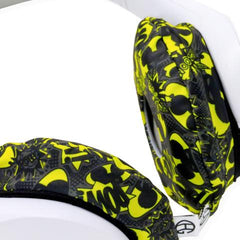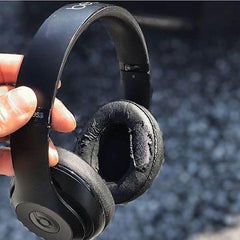Are Wireless Headphones Bad for the Brain?

At £250/$300+ for a pair of Bose NC 200s or Sony WH 1000XM3, going wireless can certainly be bad for your budget.
But are wireless headphones bad for the brain?
How Do Wireless Headphones Work?
Most wireless headphones use Bluetooth.
Bluetooth is a short-range communication network allowing devices to communicate through radio signals rather than via connecting wires.
Let’s say you want to use your wireless headphones to listen to music stored on your mobile phone. Your phone is the “master” device. When you switch Bluetooth on the phone sends out radio signals searching for other compatible devices or “slaves”.
Once your master has found a slave you have the option to pair them. This is when the master saying to the slave – we’re compatible, we can communicate with one another on this network.
In the pre-Bluetooth era, you’d have wandered around aimlessly looking for a port to shove your headphone jack into.
Bluetooth has a low-power frequency, so it isn’t a massive drain on battery power but this does mean that it only has a range of around 30 feet. Wander too far from your transmitting device, and you’ll probably notice the signal starting to cut out.
Why Do People Think Headphones are Bad for the Brain?
In 2015, 247 international scientists called on the World Health Organisation (WHO) for more research into the risk of frequent exposure to electromagnetic fields (the invisible radiation caused by electricity) on human health.
Those involved in the WHO petition were worried that regular EMF exposure could mean an increased risk of cancer, birth defects and memory issues.
Some years later, this petition to the WHO was referenced in an article written on Medium that asked whether Apple’s AirPods were safe to wear. The author spoke to Jerry Phillips, a professor of biochemistry at the University of Colorado at Colorado Springs, who said, “My concern for AirPods is that their placement in the ear canal exposes tissues in the head to relatively high levels of radiofrequency radiation."
This was picked up by the media (The Daily Mail – unsurprisingly) and was taken out of context. The WHO petition was used to support an idea that wireless headphones were bad for the brain. This was despite the fact that the original report didn’t mention wireless headphones or earphones specifically, but rather EMF devices in general such as baby monitors, broadcast towers and smart meters etc.
But the connection between the two stories stuck and has persisted to this day.
Do Wireless Headphones Give Off Radiation?
Bluetooth headphones give off non-iodizing radiation.
Non-iodizing means that the levels aren’t considered high enough to damage DNA. They give off far less radiation, for example, than a mobile phone does.
Can You Get Brain Cancer from Headphones?
Interestingly, Dr. Michael Schulder, Director of Northwell Health's Brain Tumor Center in Lake Success, New York, told Men's Health that there hasn’t yet been a ‘major bump in tumour cases’ to suggest that mobiles phones are the culprit. He infers that people are worrying unduly about wireless headphones emitting radiation, especially when we know that mobile phones emit far more.
There’s no evidence to suggest that wearing wireless headphones will give you brain cancer. Although, as the WHO petition suggests, it would be helpful to have further research especially as wireless technology now allows us to wear our headphones for much longer by allowing us to move around freely. There’s no proof that Apple AirPods “Pump radiation into the brain”, as suggested by the Daily Mail.
Scientists do have genuine concerns about long-term exposure to low-level radiation but as the petition to the WHO wasn’t specifically about wireless headphones, it might be more useful, for anyone concerned, to cut down exposure to devices that emit higher levels of EMF first like mobile phones.
The problem is that radiation is everywhere in the modern world: in our foods, in our homes, we get a dose of it every time we get on a flight or go outside in the sunshine.
If you’re genuinely concerned, then you could always switch back to wired headphones.
Can Headphones Cause Headaches?
Headphones have been known to cause external compression headaches in some users. This is nothing to do with radiation but rather with the pressure put onto the ears and head by clamping force of the headphones. Some people are more susceptible to external compression headaches than others.
Unfortunately, the clamping force is what keeps the earpads secure against the ear so there’s unlikely to be a design change anytime soon. If your headphones are new, then it could be worth gently stretching them out. Active noise-cancelling headphones do make some people feel sick and dizzy. It’s believed that the low-level sound waves set out by microphones inside the headphones can affect some people with sensitivities.
Are Wired Headphones Safer?
If you’re genuinely worried about using wireless headphones, then it’s easy enough to switch to wired. Wired headphones don’t omit radiation but the device they’re connected to (assuming it’s a mobile phone) does. Much of the talk around headphone safety is about radiation but it’s worth remembering that one of the biggest threats to your health when wearing headphones is the volume. You can suffer permanent hearing loss by listening to music at loud levels regularly. It’s one reason the WHO has added personal listening devices to its list of dangers to human health. Hearing loss is something that can happen quickly and without warning. Whether you’re wearing wired or wireless, always listen at a safe volume.
Are Wireless Headphones Bad for the Brain?
Wireless headphones aren’t going to go away.
At the moment there’s nothing to suggest that wireless headphones cause cancer or neurological problems but scientists are concerned that there hasn’t been enough research into the long-term effects of exposure to EMF-emitting devices.
The jury might still be out on whether wireless headphones are bad for the brain, but sweat-damage is definitely bad for earpads. Remember to add EarHugz to your headphone cushions before working out.







